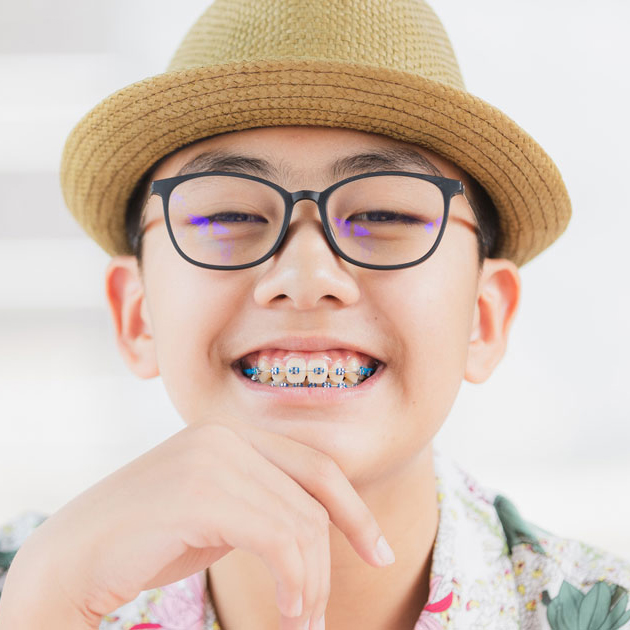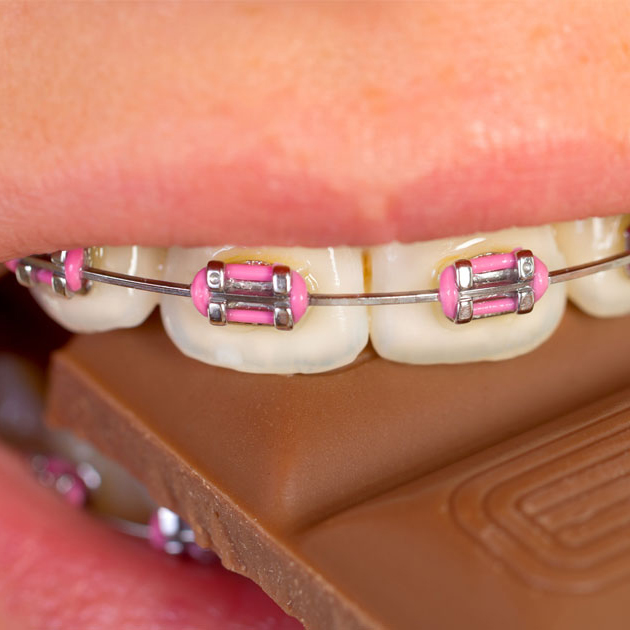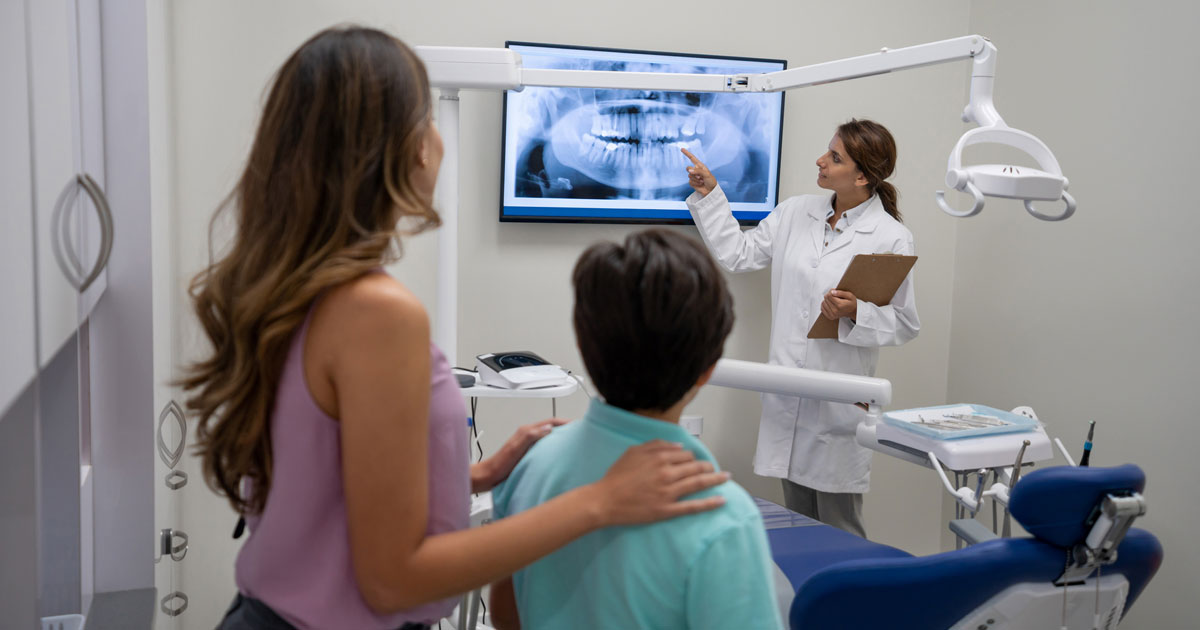We’ve rounded up common myths about braces we’ve heard either in our office or on the web. When you know the truth, you’ll find that many fears associated with braces are based on old misconceptions and unsupported myths. Read on as we break down some of the most popular (and outlandish) myths!
Designed to fix or minimize the impact of several different bite issues, braces can do amazing things for your teeth. From crooked teeth to underbites or overbites, braces can help readjust teeth so they not only look great but function as they should. Braces have advanced extensively over the years, and brace wearers continue to see advances in appearance, comfort, and bite health.
Still, we know that choosing braces can be a big decision. While there are many factors to consider, it’s important to be sure that you aren’t holding back over a completely untrue myth. In fact, there are a lot of myths about braces, many of which may lead people in need of orthodontic care to either avoid braces or care for them poorly. Unfortunately, that means myths about braces can be harmful, and it’s important to debunk them whenever possible.

Braces Will Hurt
Not true! In a more general sense, there is a common misconception that all dental work will cause pain. As a result, many individuals fear the dentist, and some are especially afraid of the orthodontist’s office. The truth is that properly placed braces should not hurt. You may experience some slight discomfort, especially at first. However, your braces should essentially be unnoticeable once you’ve grown accustomed to them.
Braces Rust
Braces are designed to spend an extended amount of time in your mouth. In addition to your own saliva, that means constant exposure to a variety of different beverages, including water. While there is a misplaced myth that metal and water automatically mean rust, when it comes to your braces, there is no fear that rust of any kind can develop. Certain metals are susceptible to rust, but braces are made with titanium alloy, which does not rust.
Braces Set-Off Metal Detectors
Flying can be stressful – not only do you need to worry about arriving on time and finding your gate, but you also need to make the dreaded trip through security. When you get to the front of the line, you’ll be asked to remove your keys and other metals, so what about your braces? Never fear: TSA is not worried about your braces. When you go through a metal detector, that detector is often screening for certain types of metal not found in braces. This means you can go through a metal detector without fear that you’ll set it off.
You Can’t Play a Musical Instrument
While braces are designed for individuals of all ages, they are an extremely common orthodontic device for teenagers. For many teens, this comes right around the time they are most involved in music, whether it’s a concert band, jazz band, marching band, or a personal project.
In addition, mouth shape and placement play a vital role in creating sound for many instruments, leading to the fear that braces will interfere with the ability to play. However, this isn’t true: you’ll be able to play successfully, even with braces. There is a chance that you’ll have a short period of adjustment, especially if you play the trumpet, but it should be brief and relatively easy to overcome.
You’ll Lock with Other Brace Wearers
Myths often start due to over-dramatized depictions on TV or in movies that become an accepted truth. One popular TV gag involves two braces-wearing individuals locking lips (often for a first kiss) and finding themselves stuck together. While this is funny to watch on TV, it will not happen in real life. Braces locking together is essentially impossible due to how small and sleek braces really are. Kiss with confidence, even if you both have braces.
Braces Interfere with Sports
High-contact sports present a higher risk of oral injury. That means that many sports, such as baseball, hockey, and football, require you to wear oral protective gear like mouth and face guards. Fortunately, this doesn’t mean you are stuck on the sidelines if you have braces. While it’s even more important that you keep your mouth safe, braces or not, when you play high-contact sports, you should invest in a quality mouthguard. This is the best way to protect your teeth from any form of damage, no matter your orthodontic situation.
Braces Attract Fish
One of the sillier myths concerning braces is that you’ll have to fight off sea life that is attracted to your mouth. Many species of fish are attracted to shiny objects. However, your braces simply aren’t that attractive to any animal, including those living in the lake or ocean. If you enjoy swimming or scuba diving, you have nothing to fear: your braces are not quite large or shiny enough to attract unwanted attention.
Braces Interfere with Electronics
Most of us have electronics available 24/7. From cell phones to tablets and other electronic devices, we rely on them for everyday use. When it comes to your braces, you have nothing to worry about regarding interference. Your braces do not conduct any kind of signal, especially not radio signals. You can enjoy your electronics without worry.
You’ll Get Struck by Lightning
This myth is one that can definitely scare someone who is considering braces. However, braces do not put you at an increased risk of a lightning strike. In general, getting struck by lightning is quite rare and can happen regardless of your surroundings or what you are wearing. There is simply not enough metal in braces – nor is it prominent enough – to make you more susceptible to lightning strikes. If you find yourself in an unexpected storm, take cover, but also take comfort in knowing you’re no more at risk than the person right next to you.
You Can’t Eat Candy
This myth can definitely cause concern for people with a sweet tooth contemplating braces. While you’ll still want to make smart choices for your oral (and general) health, you can still enjoy candy within reason. Just avoid certain candies that can cause complications with your braces. This includes caramel, chewy candy, and hard candy. You can continue to enjoy chocolate, marshmallows, cookies, brownies, and a variety of other braces-friendly sweets. What is most important is understanding the importance of keeping your teeth clean to prevent the risk of developing cavities.

Braces Permanently Straighten Teeth
There are several reasons someone might be a good candidate for braces, and not all have to do with the visual appearance of your smile. Your teeth have a significant role to play in how you speak, enjoy a variety of foods, and of course, smile with confidence. In short, misaligned teeth can impact the health of your teeth, as well as how you feel about your smile. While braces are an effective way to straighten teeth, they are not the final solution. Teeth can start to drift back to their original position over time if you don’t follow the aftercare instructions provided by your orthodontist. The most effective way to ensure your teeth remain straight is to wear your retainer as instructed.
Braces Should Be Tight
It is not uncommon for braces to be adjusted as your teeth shift in position. However, your braces don’t necessarily need to feel extremely tight to do their job. In fact, your teeth can move effectively without braces being tightened on a regular basis. For most individuals, braces usually require minimal adjustments and should not cause pain or discomfort.
You Change Wires Every Appointment
It is beneficial for your oral health to schedule regular appointments with your orthodontist. These appointments are typically simply to assess your progress and adjust as necessary. It is not uncommon for your orthodontist to leave the wires alone, especially if your teeth aren’t quite where they should be or if you are nearing the end of your treatment.
Wisdom Teeth Can Ruin Progress
Wisdom teeth can be unpredictable, but most individuals don’t worry about their wisdom teeth until their teens and early adult years. They can also come in straight, crooked, or remain partially under the surface of the gum (impaction). With how uncertain wisdom emergence can be, it isn’t a surprise that individuals in need of braces are worried that wisdom teeth can complicate the process. Your orthodontist will be able to assess if you have the necessary room for your wisdom teeth to grow in. If not, removal can be discussed. Either way, wisdom teeth will not destroy your braces’ progress.
You Have to Wear Braces for Years
One of the most common myths about braces is that this treatment must take a long time to be effective. While it does take a while for braces to move your teeth, the truth is that the time you spend in braces can vary drastically. There are numerous factors that go into the length of time you’ll be required to wear braces, including the severity of the bite issue, the condition of your teeth, and the desired outcome. The average treatment schedule for braces lasts 18 months, though your treatment could last longer or end earlier.
You’ll Know the Exact Date Your Braces Come Off
Your orthodontist can provide an expected projection of treatment, but it is not an exact science. Everyone’s journey is unique and can be impacted by a variety of factors. While it is impossible to have an exact prediction, you’ll be given an expected completion window. Your orthodontist will also be able to provide clearer expectations as you move through your treatment.
You Don’t Need to Wear Rubber Bands

A Dentist Can Provide Braces
There is a common misconception that dentists and orthodontists perform the same services. While they do share similar training, orthodontists specialize in corrective dental treatments, including braces. If you are considering straightening your teeth or correcting an overbite, underbite, crossbite, or other bite issue, or brace treatment, a professional orthodontist will ensure you receive the best care possible.
Braces Are Unsightly
Long gone are the days when metal braces were the only option. While traditional metal braces are sleeker and less obtrusive than ever before, there are several different options for braces you can consider. Your orthodontist can help you determine whether you should consider a number of discreet options, including Invisalign. These are especially popular for adults who are reluctant to get braces due to social stigma.
Braces Are Only for Kids and Teenagers
This myth couldn’t be further from the truth, though it mainly stems from the fact that many people do get braces while they are younger. However, this isn’t always the case. Sometimes braces are put on hold due to financial reasons, concerns caused by various myths (which is why we are busting them), or changes in oral health that happen over time. Braces can be the right decision for individuals of any age, and your orthodontist can help you determine if braces are right for you. If you are experiencing pain, discomfort, or lack of confidence due to the way your teeth are positioned, braces could be the ideal solution.
Visit Robison Orthodontics

If you are still experiencing hesitation regarding braces, our professionals are here to debunk any myths and discuss Gilbert, Arizona orthodontic treatment options that will work for you.

Dr. Tyler Robison is an alum of Mesa’s Mountain View High School. He graduated from Brigham Young University before being accepted to the “Top Ten-nationally ranked” University of Louisville in Kentucky, where he earned his Doctorate in Dental Medicine and a Master’s Degree in Oral Biology. He graduated with honors in the top ten percent of his class. Dr. Robison continued at the University of the Pacific in San Francisco, where he received a second master’s degree in dental science and his orthodontic certification.


